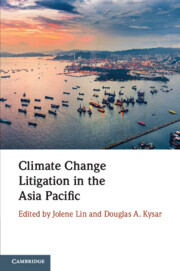Book contents
- Climate Change Litigation in the Asia Pacific
- Climate Change Litigation in the Asia Pacific
- Copyright page
- Contents
- Figures
- Tables
- Contributors
- Foreword
- Abbreviations
- Introduction
- Part I Theoretical Underpinnings and Implications of Climate Change Litigation
- Part II International Law and International Adjudication
- Part III Domestic Law and Domestic Adjudication
- 7 ‘Next Generation’ Climate Change Litigation in Australia
- 8 Climate Change Litigation: A Possibility for Malaysia?
- 9 Climate Change Litigation in Indonesia
- 10 From Shehla Zia to Asghar Leghari: Pronouncing Unwritten Rights Is More Complex than a Celebratory Tale
- 11 Climate Change Adaptation Litigation: A View from Southeast Asia
- Part IV China, Courts and Climate Change
- Index
9 - Climate Change Litigation in Indonesia
from Part III - Domestic Law and Domestic Adjudication
Published online by Cambridge University Press: 06 November 2020
- Climate Change Litigation in the Asia Pacific
- Climate Change Litigation in the Asia Pacific
- Copyright page
- Contents
- Figures
- Tables
- Contributors
- Foreword
- Abbreviations
- Introduction
- Part I Theoretical Underpinnings and Implications of Climate Change Litigation
- Part II International Law and International Adjudication
- Part III Domestic Law and Domestic Adjudication
- 7 ‘Next Generation’ Climate Change Litigation in Australia
- 8 Climate Change Litigation: A Possibility for Malaysia?
- 9 Climate Change Litigation in Indonesia
- 10 From Shehla Zia to Asghar Leghari: Pronouncing Unwritten Rights Is More Complex than a Celebratory Tale
- 11 Climate Change Adaptation Litigation: A View from Southeast Asia
- Part IV China, Courts and Climate Change
- Index
Summary
In the last decade, there has been a growing number of climate change litigation in various countries. This chapter addresses climate change related lawsuits in Indonesia, which have emerged in three different kinds of lawsuit: litigation related to coal mining, litigation on coal power plants, and litigation related to deforestation and peatland fires. The chapter attempts to provide a general description of Indonesia’s climate litigation. It finds that while the first two types of litigation focus on the government’s failures to take climate change into account in its policies, the deforestation and fires litigation is more similar to public nuisance-based climate litigation. Moreover, the Indonesian approach in the deforestation and fires litigation offers a different way to address the issue of causation. Instead of focusing on the defendant’s liability to pay compensation for climate damage, the Indonesian approach requires the defendant to pay the restoration cost for reducing greenhouse gas emissions, which were calculated based on the price of a ton of carbon in the “carbon market.” The chapter examines whether this approach is defensible and considers the question of “fairness” of the imposition of restoration cost to the defendant.
Keywords
- Type
- Chapter
- Information
- Climate Change Litigation in the Asia Pacific , pp. 234 - 260Publisher: Cambridge University PressPrint publication year: 2020
- 3
- Cited by

